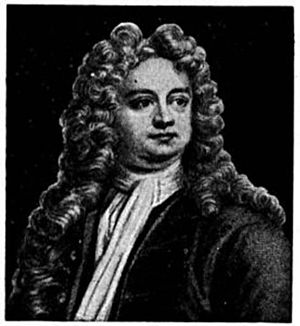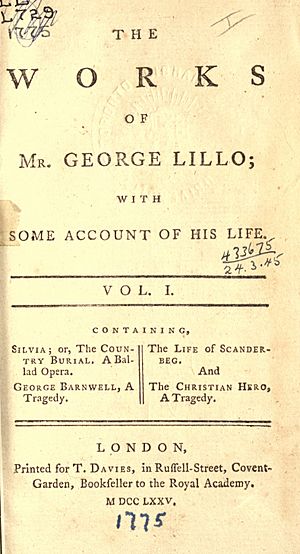George Lillo facts for kids
Quick facts for kids
George Lillo
|
|
|---|---|
 |
|
| Born | 3 February 1691 Moorfields, London |
| Died | 4 September 1739 Rotherhithe, London |
| Notable works | The London Merchant |
George Lillo (born February 3, 1691 – died September 4, 1739) was an English playwright. He wrote plays, especially tragedies. He also worked as a jeweller in London.
Lillo created his first play, Silvia, or The Country Burial, in 1730. A year later, he wrote his most famous play, The London Merchant. He wrote at least six more plays before he passed away in 1739. These included The Christian Hero (1735) and Fatal Curiosity (1737).
Contents
Life of George Lillo
George Lillo was born in Moorfields, a part of London. He joined his father's business. They worked as goldsmiths and jewellers.
Early Plays and Success
Lillo wrote at least eight plays. He created them between 1730 and his death in 1739. His first play for the stage was a ballad opera called Sylvia, or The Country Burial. It came out in 1730.
Lillo hoped Sylvia would be as popular as The Beggar’s Opera. However, Sylvia got mixed reviews. It was only shown for three nights at Lincoln's Inn Fields.
The next year, Lillo wrote his most famous play. It was called The London Merchant, or The History of George Barnwell (1731). This play became one of the most popular plays of the 1700s. In October 1731, it was even performed for King George II and Queen Caroline.
The London Merchant was a new type of play. It was called a melodrama. It showed how bad choices can lead to more bad choices. The main character, Barnwell, makes a mistake. This leads him to rob his boss and murder his uncle.
Lillo changed what a tragedy could be about. Before, tragedies were usually about kings or heroes. Lillo showed that everyday people could also have sad downfalls. The play was based on an old story about a murder. Lillo dedicated his play to Sir John Eyles, a rich merchant. This showed that plays were starting to focus on regular townspeople, not just the royal court.
New Kinds of Tragedies
Lillo helped bring back a type of play called domestic tragedy. This means a sad play about everyday family life. Earlier English plays sometimes showed merchants. But The London Merchant was a big change for tragedies.
Instead of grand stories about ancient heroes, Lillo's plays were about regular people. They were like the audience members themselves. His tragedies took place in homes, not in big kingdoms.
Lillo wanted plays to teach good lessons. He wanted them to follow Christian values. In 1734, he wrote a patriotic play called Britannia and Batavia. It was for a royal wedding. His next play was The Christian Hero (1735). It told the story of a hero named Skanderbeg.
Later Works and Legacy
Later in his life, Lillo wrote Fatal Curiosity (1737) and Marina (1738). He based Marina on a play by William Shakespeare called Pericles. His very last play was Elmerick, or Justice Triumphant. It was performed after he died in 1740. Lillo also adapted an old play called Arden of Feversham. This play was also performed after his death in 1759.
In his time, Lillo's later plays were not as successful as The London Merchant. After he died, older types of plays were still popular. Only three of Lillo's plays made a profit.
George Lillo passed away at age 48 in 1739. He died in Rotherhithe, London.
See also
 In Spanish: George Lillo para niños
In Spanish: George Lillo para niños
 | Selma Burke |
 | Pauline Powell Burns |
 | Frederick J. Brown |
 | Robert Blackburn |


